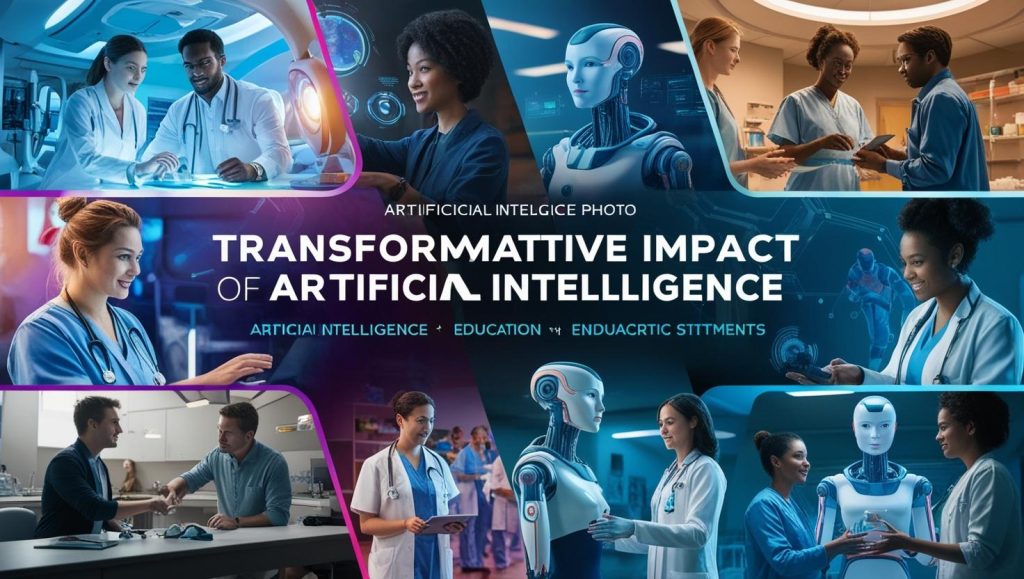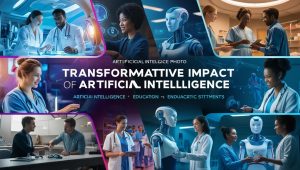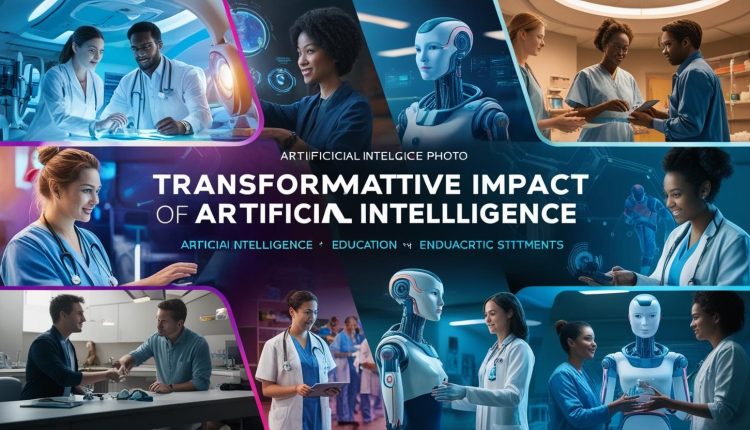How Artificial Intelligence is Transforming the Future of Industries: From Healthcare to Education
Introduction
Artificial Intelligence (AI) is no longer confined to laboratories or high-tech companies—it is reshaping entire industries across the globe. From healthcare and education to manufacturing, finance, and beyond, AI is revolutionizing processes, enhancing productivity, and creating new opportunities.
This article explores how AI is transforming multiple industries, highlighting key applications, challenges, and the future of work in an AI-driven economy.
AI in Healthcare
Healthcare is among the fastest adopters of AI technologies, leveraging its capabilities to improve diagnostics, treatment, and patient care.
Key Applications
-
Medical Imaging Analysis: AI algorithms detect diseases such as cancer or cardiovascular conditions more accurately and quickly than traditional methods
-
Predictive Analytics: AI predicts patient outcomes, hospital readmissions, and disease progression
-
Virtual Health Assistants: AI-powered chatbots and voice assistants support patients with scheduling, reminders, and basic medical advice
-
Drug Discovery: AI accelerates research by analyzing vast datasets to identify potential compounds for new medications
Impact: AI reduces diagnostic errors, enhances treatment accuracy, and optimizes healthcare delivery, making medical services more efficient and accessible.

AI in Education
Education is experiencing a digital transformation powered by AI, creating personalized learning experiences and improving administrative efficiency.
Key Applications
-
Adaptive Learning Platforms: AI customizes lessons based on student performance and learning pace
-
Automated Grading: AI reduces teacher workload by evaluating assignments and providing instant feedback
-
Student Analytics: AI monitors engagement and identifies students who may need additional support
-
Virtual Classrooms: AI enhances online learning environments with interactive and responsive tools
Impact: AI empowers educators to focus on creative and strategic teaching, while students receive a more tailored and effective learning experience.
AI in Manufacturing
The manufacturing sector is leveraging AI to enhance efficiency, quality, and safety.
Key Applications
-
Predictive Maintenance: AI predicts equipment failures before they occur, reducing downtime
-
Quality Control: Computer vision and AI algorithms detect defects with high precision
-
Supply Chain Optimization: AI forecasts demand, manages inventory, and improves logistics
-
Automation: AI-powered robots handle repetitive tasks, freeing human workers for strategic roles
Impact: AI improves production efficiency, reduces costs, and enables more flexible and responsive manufacturing processes.
AI in Finance and Banking
AI is revolutionizing the financial industry by improving accuracy, reducing risk, and enhancing customer experience.
Key Applications
-
Fraud Detection: AI analyzes transaction patterns to detect and prevent fraudulent activity
-
Algorithmic Trading: AI evaluates market data and executes trades with speed and precision
-
Customer Service Automation: AI chatbots provide real-time support, freeing human agents for complex inquiries
-
Risk Assessment: AI predicts loan defaults, market volatility, and creditworthiness
Impact: AI helps financial institutions operate more efficiently, make data-driven decisions, and deliver better service to clients.

AI in Retail and E-Commerce
Retailers are using AI to understand consumer behavior, optimize operations, and create personalized shopping experiences.
Key Applications
-
Recommendation Engines: AI suggests products based on browsing history and past purchases
-
Inventory Management: AI predicts demand and ensures optimal stock levels
-
Customer Service: AI-powered chatbots provide instant support and streamline transactions
-
Pricing Optimization: AI dynamically adjusts prices based on market trends and competitor analysis
Impact: AI drives sales, improves customer satisfaction, and increases operational efficiency.
AI in Transportation and Logistics
Transportation and logistics industries are undergoing a profound transformation thanks to AI technologies.
Key Applications
-
Autonomous Vehicles: AI controls self-driving cars, trucks, and delivery drones
-
Route Optimization: AI predicts traffic patterns and optimizes delivery routes
-
Fleet Management: AI monitors vehicle performance, fuel consumption, and maintenance needs
-
Predictive Demand: AI forecasts shipping needs and optimizes warehouse operations
Impact: AI reduces costs, improves safety, and increases the speed and reliability of transport and logistics services.
AI in Energy and Utilities
The energy sector is embracing AI to improve efficiency, sustainability, and reliability.
Key Applications
-
Smart Grids: AI predicts energy demand, balances load, and prevents outages
-
Renewable Energy Optimization: AI optimizes solar and wind energy production
-
Predictive Maintenance: AI monitors infrastructure, including pipelines and turbines, for maintenance needs
-
Energy Efficiency: AI analyzes consumption patterns to reduce waste
Impact: AI contributes to a more sustainable, efficient, and resilient energy infrastructure.
Ethical and Operational Challenges
Despite its benefits, AI adoption across industries raises several challenges:
Data Privacy and Security
AI systems rely heavily on data, making them targets for breaches. Ensuring secure and ethical data use is critical.
Workforce Displacement
Automation may replace certain roles, requiring strategic workforce reskilling and adaptation.
Algorithmic Bias
AI may produce biased outcomes if trained on unrepresentative data. Transparency and monitoring are essential.
Regulation and Governance
Industries must adopt AI responsibly, following legal, ethical, and societal guidelines to ensure safe implementation.
Preparing for an AI-Driven Future
Industries and individuals must prepare proactively to thrive in the AI era.
For Organizations
-
Invest in workforce upskilling
-
Develop ethical AI policies
-
Integrate AI tools strategically into operations
-
Foster a culture of innovation and adaptability
For Individuals
-
Acquire AI and data literacy skills
-
Focus on creative, analytical, and interpersonal abilities
-
Embrace lifelong learning
-
Collaborate effectively with AI systems
Conclusion
Artificial Intelligence is transforming industries across the spectrum, from healthcare and education to finance, retail, and energy. Its impact is profound, enhancing efficiency, productivity, and innovation, while also presenting ethical, operational, and workforce challenges.
The industries that will thrive in the AI era are those that embrace AI strategically, balance technology with human expertise, and commit to ethical and responsible deployment.
AI is not just a tool—it is a partner in shaping the future of industries and work itself.

